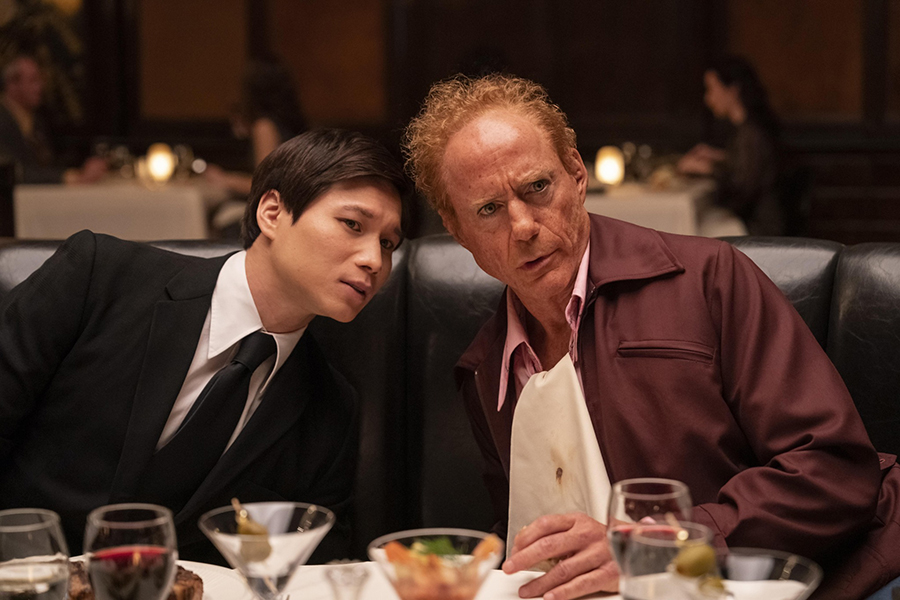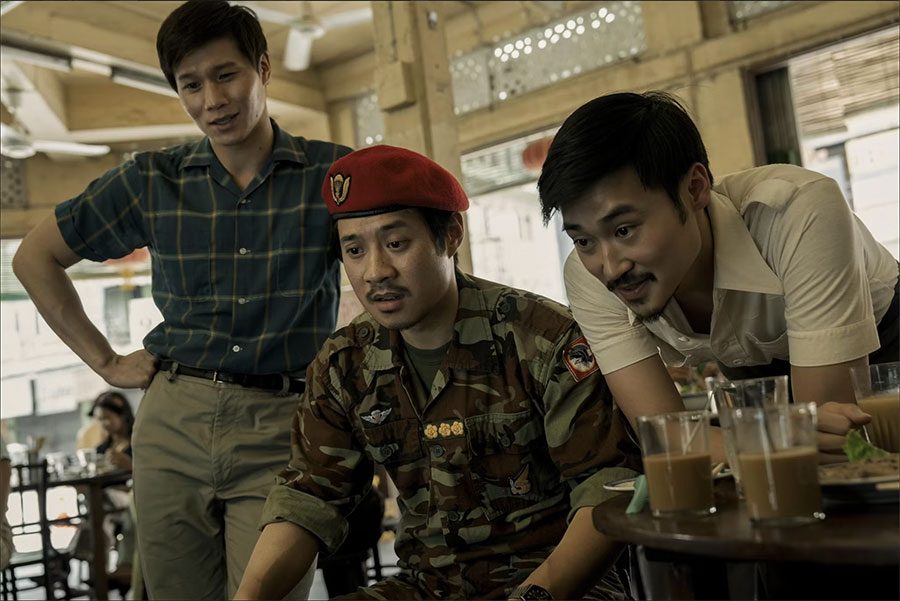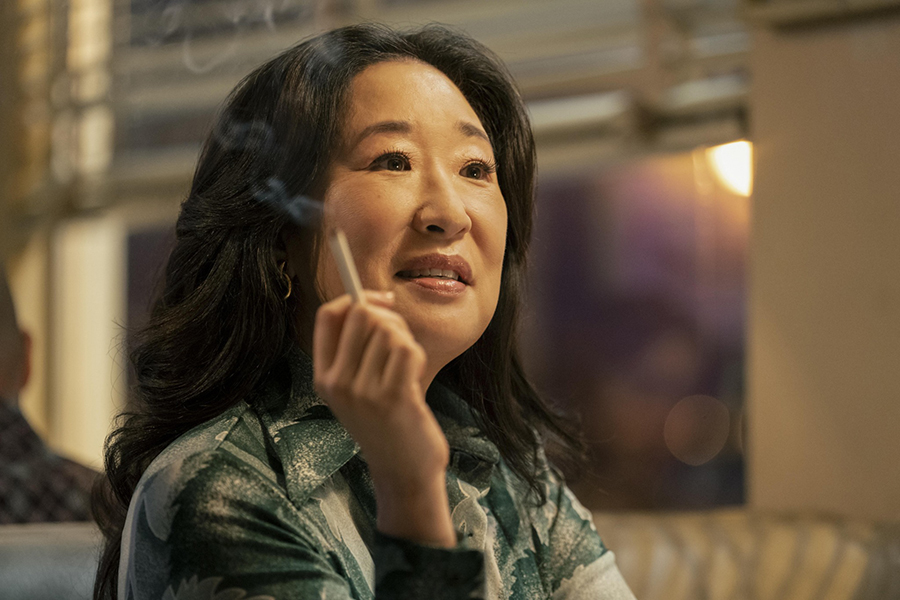The Dawn of a New Don McKellar: The Canadian Filmmaker Talks His First Hollywood Series, ‘The Sympathizer’

Toronto-born Don McKellar, 60, co-created and co-executive produced the new HBO limited series 'The Sympathizer', based on Viet Thanh Nguyen's Pulitzer Prize-winning novel. Photo: Emma McIntyre/Getty Images
This country has produced, and exported, bigger stars. But no one working in Canadian cinema has finessed the actor-writer-director triple play with the durable range and virtuosity of Don McKellar. In a 35-year career he has directed six feature films, written or co-written seven and acted in over 30 – from starring in his own movies to those by Toronto peers David Cronenberg, Atom Egoyan, Bruce McDonald and Patricia Rozema. Not to mention he’s done a ton of TV work. And he accomplished it all without going to Hollywood.
Until now.
At 60, McKellar has finally made the leap, as co-writer and showrunner of The Sympathizer, a seven-hour A24 series starring Robert Downey Jr. that premieres on HBO on April 14. McKellar, who could have a second career as a stand-up comic, offered a deadpan twist on his good fortune at the Toronto Film Critics Association annual gala last month. Presenting the TFCA’s $50,000 Rogers Best Canadian Film Award, he said: “Self-respect is what really matters to me, and it took a hit with this production. Early on in this business, I realized that for an ambitious young Canadian filmmaker, the big achievement is to stay in Canada. You can move to the States and if everything goes well, you’ll be one of thousands of successful filmmakers. But if you stay in Canada, you’ll be maybe one of five.”
McKellar hasn’t moved to the States. But in an interview last week, he modestly granted that landing a major HBO series was a pretty big deal. “People seem to think I did a good job,” he said, “We’ll see how it does.”
The Sympathizer, based on the Pulitzer-prize winning novel by Viet Thanh Nguyen, tells the fictional story of a young Communist spy known only as the Captain (Hoa Xaunde), a Viet Cong mole working as an aide to “the General” in South Vietnam. In the final days of the war, the Captain – a bi-racial, blue-eyed Vietnamese American – flees Saigon with the General. And in a fractious California enclave of Vietnamese refugees, the espionage intrigue becomes a ticking time bomb as he’s wracked by conflicting loyalties. With more than half the dialogue in subtitled Vietnamese, the story unfolds entirely from the Captain’s viewpoint.
Countering a glut of American movies about the Vietnam conflict, The Sympathizer aims to repatriate the story to the Vietnamese, with an intricate drama that is by turns harrowing, heartbreaking, and boldly satirical. Most of the satire is delivered by Downey, who is virtually unrecognizable as he shapeshifts through a quintet of gonzo roles – from a sleazy CIA agent to a shambolic Hollywood auteur mired in his own private Apocalypse Now.

The show’s only other marquee star, fellow Canadian Sandra Oh, 52, makes a meal of a supporting role as Sofia Muri, the Captain’s Japanese-American girlfriend. Ever since Oh co-starred with McKellar in his 1998 apocalyptic romance Last Night (arguably his best film), they’ve been frequent collaborators. The Sympathizer “is probably my 10th project with Don,” she told me in video interview from Los Angeles. “He was on the set every day, working really hard. That responsibility as a showrunner – it’s the biggest job in Hollywood. But I feel Don found comfort in this high-level international production. It was smooth sailing.”
Her friendship with McKellar was invaluable, she adds. “I really benefited from a lot of access, which was like ‘What is this? I don’t understand. Will you please come over for dinner and we could talk about this.’ And we would be in my kitchen debating what it means.”
The show’s Canadian complexion doesn’t end there. Leading The Sympathizer’s largely Vietnamese cast are two Montreal actors, Fred Nguyen and Duy Nguyen, in lead roles as the protagonist’s “blood brothers.”

The brains behind the project are a Canuck and a Korean – McKellar and co-showrunner Park Chan-Wook (Old Boy, Decision to Leave), 60, who directs the first three episodes of the series with his signature edge of cruelty and wit. And as an executive producer, it was McKellar’s long-time cohort, Niv Fichman of Toronto’s Rhombus Media, who got the project rolling and took it to producer Susan Downey (Robert’s wife), HBO and A24 with Park and McKellar on board.
Thirty-five years ago, McKellar made his film debut in Bruce McDonald’s Roadkill, as an oddball loser who lacks the nerve to fulfill his dream of being a serial killer. Last week I spoke to him in a video interview from a Los Angeles hotel room. With his greying beard and debonair charm, McKellar looked like a not-quite-elder statesman of Canadian cinema, at home in the world and owning the room.
BRIAN D. JOHNSON: So Don, how did you get involved in this?
DON McKELLAR: Niv Fichman asked me to read the book and l loved it. Weirdly, I felt I had a personal connection with it. The author had said his dream director would be Park Chan-Wook. And the voice of the book has a cinematic parallel with Chan-Wook’s style – the satiric elements, the wit, the intelligence and control. Chan-Wook liked the idea of a co-showrunner because he’d already done the TV series The Little Drummer Girl and I think it was extremely taxing for him. I’d written a script with him many years ago, which was never made. So he already knew that we liked each other and we had a shorthand.

BJ: His English was good?
DM No. I communicated through a translator almost exclusively. He needed someone who spoke English. It helped to have someone around who could tell actors where they were and what was going on. I supervised the entire series and made sure the shape held together and the acting was consistent and our vision was fulfilled. And I had to do all the negotiating with the studio that he probably wasn’t super interested in.
BJ: What was it about the book that you related to personally?
DM: That it’s a young man coming of age in the seventies. I was a little younger, but I remembered the seventies in my youth, the political coming of age, this feeling of being an outsider in your own life, a spy in your own environment. And I don’t want to overplay this, but my grandmother was born in China and I come from missionary stock. I had this strange quirk in my family history growing up in very WASP-y North Toronto. There were always Chinese things around and I was curious about that. I flirted with communism, much to my parents’ dismay, and read tons of communist stuff. I understood the psychology of where this guy was coming from, at least on an intellectual level.

BJ: How did you collaborate with Park Chan-Wook?
DM: We thought of ourselves as very much like the Captain, this two-headed show-running entity where he was the East, I was the West. So we had this balance. Chan-Wook is the same age as me. So we remember the feeling of the seventies, the turmoil and cultural change that came out of Watergate and the end of the Vietnam War and the beginning of the disco era. When you’re making a [writers] room, you want to represent different, diverse elements in the room – obviously primarily Vietnamese people. But so many times I thought one of the valuable things that I brought was my age. My identity was forged in the seventies. And I found myself saying things like “there were no twist-top wine bottles then” or just explaining the politics of the time.
BJ: My political coming-of-age happened in campus protests against the Vietnam War. As a Korean, Park Chan-Wook must have had a different experience.
DJ: Totally. They were official combatants. There was controversy and famous atrocities that they were involved in. On the flip side, there was also huge protesting and resistance. But internationally the Vietnam story is always told as America’s involvement in the war, which is very strange. More than any other war, people’s image of it was through American movies and media.
BJ: The Sympathizer zeroes in on that when the Captain gets hired as a cultural advisor on a Vietnam war movie directed by a deranged Robert Downey Jr. Having him play a whole range of characters, was that your idea?
DM: It was Chan-Wook’s idea. These characters keep popping up, representing different aspects of the American establishment – in academia, politics, intelligence, entertainment. They’re all interconnected, and he said, “What if they’re all played by the same actor?” Like Peter Sellers in Dr. Strangelove.
BJ: How was it working with Downey?
DJ: It was really great. Of course, I was anxious because you just don’t know with these kind of guys. And he has a bit of a reputation. The image is that he’s of out of control, but he’s not. It’s the opposite. It’s that kind of AA personality. He’s extremely professional and lovely on the set. Really gracious to the other actors, hangs out, tells stories, totally engaged. People have this idea that he was just improvising all over the place, but that’s not true. And he would like me to clear that up. I said at one point after a scene, “Oh, that’s a funny line you came up with at the end, you’re always coming up with funny stuff.” And he said, “Don, I’m just following the script. I’m just doing the job, you know?” And it’s true, he really did follow the script. He would always throw stuff out there and come up with inventive little twists. And he made each take totally different, as an actor should do. But he was extremely committed and respectful of the showrunners.
BJ: And Sandra Oh – I assume that was your casting choice?
DM: No. I love Sandra but it was actually Viet [the book’s author] who said, “You know, my perfect casting for Sofia would be Sandra Oh.” I said hmm, I think I could get in touch with her. I texted her and got a response almost overnight. This character is an older woman – not the normal spy’s love interest in the Captain’s mind – and Viet wanted someone strong.

BJ: She’s such a force. What was it like working with her again?
DM: She’s just a great leader and so respected. We had a lot of inexperienced actors in the Vietnamese parts (as well as some very experienced ones). She was so generous in rallying their spirits and just understanding the importance for the community. She was amazing. It wasn’t a Canadian conspiracy, although I was very happy that we kept drawing on Canada. Most of the cast is not American. Robert Downey is basically carrying the torch for America, while our lead is from Australia and our directors are from all over the place. [After Park, the remaining four episodes were directed by Marc Mundon and Fernando Meirelles, from the U.K. and Brazil.]
BJ: The whole notion of identity is at the core of this show – something Canadians can relate to given that most us have amalgamated identities of some sort.
DM: That is where the Canadian perspective helps for sure. There’s a lot of discussion down here about this divided country and these binary political ideologies. The point of this show is to step back and ask you to sympathize with the other side and say: this isn’t your normal hero as you Americans have come to expect. It’s a Vietnam story with a Vietnamese lead. This character is a Communist, and early on HBO said, “We have to explain to people – why Communism? Why do we have a Communist lead?” And I said, “Well, you want me to start off the series with explaining the appeal of Communism?
BJ: After this experience, would you decamp to L.A. if given the chance?
DM: I loved it and it was really exciting and an interesting late-career thing to do. It was also exhausting. It’s so deep and so endless that it’s a blessing and a curse. If I was to decamp down here, I would have to be very confident that what I was doing was worth it.
BJ: At the TFCA Awards, you joked about fleeing to America because Telefilm wanted to fund first features by as many people as possible. The Canadian and American industries have very different approaches to mandating diversity. But you’ve just used Hollywood money to create a show about identity politics that you couldn’t make here.
DM: It’s funny. I’ve often noted that Canada, at least officially, is devoted to diversity in the culture industries, but it’s in America where I was allowed to do a show that is mostly in Vietnamese.
BJ: How did the stresses of the job affect your life/work balance. Do you have a partner?
DM: Yeah, I have a girlfriend. It’s hard on a relationship, but we’ve survived. L.A. is a real workaholic town. I think people in the rest of the world don’t understand that. They think of it as some decadent place of debauchery. But people never debauch as far as I can tell. There’s more debauchery in Sudbury.
RELATED:
Kim Cattrall and Don McKellar On Aging, Acting and Sensitive Skin
Donald Sutherland, 88, to Detail His Journey to Hollywood Fame in Long-Awaited Memoir